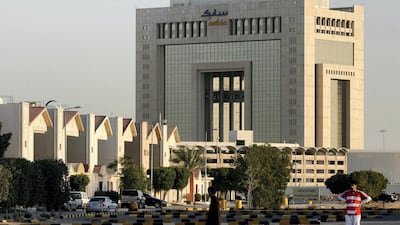A recycling subsidiary owned by Saudi Arabia's Public Investment Fund signed an agreement with the region's largest petrochemicals company to set up a venture to use recycled plastic feedstock.
The planned scheme with Saudi Basic Industries, also known as Sabic, is the first such project for the Saudi Investment Recycling Company.
The agreement between the two companies also includes a feasibility study on building a chemicals recycling plant in Saudi Arabia to convert mixed plastic waste into pyrolysis oil.
Also known as bio crude, pyrolysis oil is a synthetic substitute for petroleum and is used in various heating applications.
The agreement reinforces Saudi Arabia's commitment to a circular carbon economy "ensuring a sustainable future focusing on environment, energy and climate", said Yousef Al Benyan, vice chairman and chief executive at Sabic.
A circular carbon economy refers to the continual reduction, reuse and recycling of carbon-based products and materials to eliminate waste.
Countries such as Saudi Arabia, the world's biggest exporter of crude, are looking at ways to mitigate the energy impact of fossil fuel production and consumption.
Under the terms of the agreement, the SIRC will use mixed plastic waste collected from its facilities as feedstock for the manufacture of pyrolysis oil.
The PIF-owned company will "source, collect, sort and supply the feedstock" for chemical recycling from municipal solid waste, it said in a statement.
The agreement with Sabic provides "an impetus" to various initiatives identified in Saudi Arabia's waste management and national regulatory framework, said SIRC chief executive Ziyad Al Shiha.
"It will also help create new opportunities in the waste management sector. We established SIRC with an aim to build, develop and invest in the waste management sector in Saudi Arabia," he added.
PIF, Saudi Arabia's sovereign fund, has been tasked with investing in renewable energy and clean ventures as part of its mandate. Alongside its partners, it is developing about three quarters of the kingdom's renewables capacity.
The fund is a major shareholder in power plant developer Acwa Power, which is increasingly investing in renewables projects.


